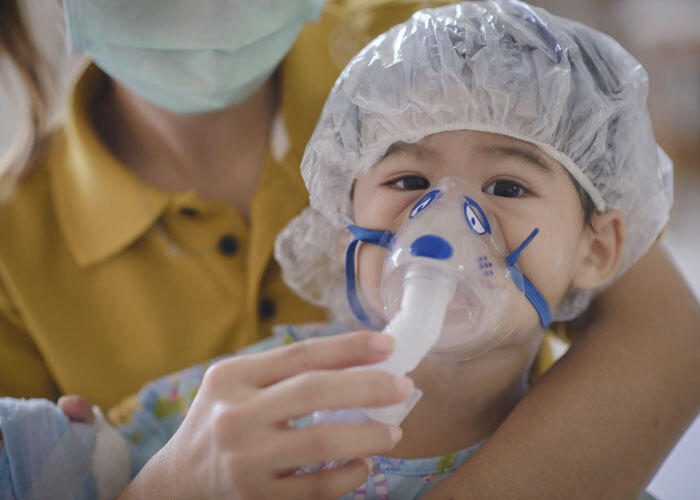When parents across the world are busy securing their child against the threat of COVID-19, they are not considering any other virus that can affect their newborn’s health. Out of all the deadly viruses out there, RSV or Respiratory Syncytial Virus is among the most threatening ones, especially for babies under the age of 2.
Every year, 4-5 million cases of RSV in babies are found worldwide, most of them pertaining to children under the age of 4. As a result, a whopping 125,000 babies have to get hospitalized because of the infection.
What makes it even more fatal is that the symptoms are pretty much similar to getting a cold. And therefore, you might not take it seriously. But, beware parents, getting your baby checked by a paediatrician could prove to be a lifesaver and is highly recommended.
Let’s walk through its symptoms, similarity with COVID-19, and the possible remedies.
Symptoms of RSV in Babies
The symptoms of the said virus usually crop up four to six days post its hold on the baby. Here we are listing a few:
- Cough (dry or wet) and sneezing
- Short or shallow breathing
- Fever
- Rapid breathing
- Belly breathing
- Irritability
- Runny nose
- Reduced alertness
- Poor feeding
- Tiredness
- Breathing difficulties such as apnea (pauses in breathing)
- Head bobbing while breathing
- Wheezing
As a Parent, What Should You be Mindful of
RSV in babies is most commonly characterized by breathing difficulties. The baby may be seen struggling for each breath as a result of the pull of the chest muscles. What is to be noted here is that fever may not always hit your child when infected with the said virus.
Cold may catch your child at the beginning of the infection spread. It may be followed by other life-threating diseases such as bronchiolitis or pneumonia if you don’t see a doctor. Unfortunately, it’s almost impossible to differentiate between common cold & RSV infection.
RSV & Corona Virus: The Similarities
The symptoms of both are found to be quite similar as they fall into the category of respiratory viruses. Therefore, when infected with COVID-19, the baby would reflect similar symptoms like runny nose, fever, cough, among others.
However, there are more chances of your infant catching COVID if he is already infected with RSV as RSV infection leads to decreased immunity. Your paediatrician might suggest testing for COVID if your baby shows symptoms of RSV.
How Does RSV Infect Babies?
RSV in babies enters through the eyes, mouth, or nose. Further, it’s a contagious infection and can travel through the baby to a person located in close vicinity to the child.
Here are two common ways RSV spreads itself in infants:
Droplets (respiratory): Virus can enter into a baby via respiratory droplets coming from an infected human when sneezing or coughing while in close vicinity to the baby.
Infected Surfaces: RSV can sit on surfaces for long. Touching contaminated doorknobs, countertops, toys, or crib rails can result in catching the virus. Keeping infected toys in the mouth or hand can also result in the same.
Hacks to Prevent your Child from Catching RSV
There has not been invented a vaccine to prevent children from RSV till date. But you can keep your child away from the fatal virus by taking a few precautions listed below:
- Using handwash to wash your as well as child’s hands frequently. Alcohol-based sanitiser must be used multiple times a day.
- Don’t kiss the baby if you are suffering from cold or have symptoms of the same.
- Refrain from taking your baby to someone showing symptoms of fever or cold.
- Hygiene in the house must be well maintained at all times. Keep disinfecting door handles, doorknobs, bathroom countertops, etc.
- Avoid sharing baby belongings such as toys, bottles, etc., with other kids.
- Don’t smoke in the close vicinity of the infant.
- Regularly wash the baby’s toys, especially if some family member has got respiratory issues.
Deciding the Right Time for taking the Baby to the Paediatrician…
Take your kid to the doctor if severe symptoms such as blue color of nails, skin, or lips are identified. Breathing troubles and high fever demand immediate medical attention. Not a single wet diaper in eight hours is a cause for worry as it signifies dehydration that would have been caused by the RSV infection.
Key Takeaway
RSV in babies usually is found under the age of two; however, many cases are found in children way above the age of two. The potential ways of limiting the said infection among babies are – maintaining a good overall hygiene within the household, which primarily comprises coughing & sneezing etiquettes, and hand hygiene. And most importantly, keeping your infant at a safe distance from those suffering from cold or some other respiratory disease.
